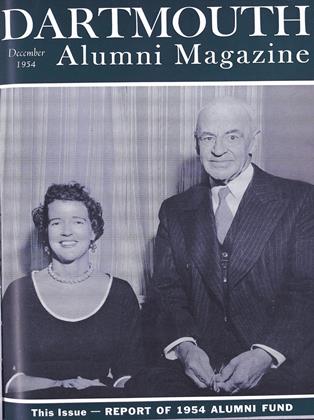By Dr. Seuss(Theodor S. Geisel '25). New York: RandomHouse, 1954. $2.50.
The elephant, Horton, with greatest of care Rescues a small speck of dust from the air.
He finds it is lived on, a village of Whos Which Horton takes care of without more ados, But runs into trouble with some kangeroos.
The latter are certain that Horton is mad For he talks to himself which is certainly bad.
Poor Horton, of course, is merely conversing With the village of infinitesimal Whos he is nursing.
A conflict develops, the answer you'll find By reading the book, if you are so inclined.
This is the first time, and it's somewhat a ditty. That a villain has been introduced into the ditty.
His fate, as is proper, is duly confounded.
The triumph of virtue leaves no one astounded.
It has miniscule print, superhuman behaviour, And Jo-Jo who turned from a twerp to a saviour.
The poem's illustrated by fantastic pictures Of animals hampered by no normal strictures.
The poetry's rhyming flows merrily on In this annual, longed-for phenomenon.
There is even a moral, if such is your taste: The Small must be guarded with no time to waste; For "A person's a person, no matter how small" Is a motto that should be a lesson to all. In parting, as this review comes to a close, It is certain in future, I'm sticking to prose!
Revieiuer's Note: Try to say at this point in a couplet - "Dr. Seuss does better with completely untrammeled plots allowing his imagination to expand madly in all directions than when he confines himself to a villain pursuing and persecuting the noble hero."
 View Full Issue
View Full Issue
More From This Issue
-
 Feature
FeaturePREFACE TO DARTMOUTH
December 1954 By EDWARD CONNERY LATHEM '51 -
 Feature
Feature"The Record of Their Fame"
December 1954 By FORD H. WHELDEN '25 -
 Feature
Feature"They Game from America and They Were Four"
December 1954 By PROF. HENRY B. WILLIAMS, -
 Feature
FeatureA Report on Finances
December 1954 -
 Class Notes
Class Notes1918
December 1954 By ERNEST H. EARLEY, W. CURTIS GLOVER, RICHARD P. WHITE -
 Class Notes
Class Notes1930
December 1954 By ALEX J. MCFARLAND, CHARLES V. RAYMOND, HENRY S. EMBREE,
MAUDE D. FRENCH
-
 Books
BooksIF I RAN THE ZOO,
January 1951 By MAUDE D. FRENCH -
 Books
BooksTHE ART NOUVEAU
July 1952 By Maude D. French -
 Books
BooksSCRAMBLED EGGS SUPER.
May 1953 By Maude D. French -
 Books
BooksHAPPY BIRTHDAY TO YOU!
November 1959 By MAUDE D. FRENCH -
 Books
BooksTEN APPLES UP ON TOP!
June 1961 By MAUDE D. FRENCH -
 Books
BooksTHE CAT IN THE HAT — BEGINNER BOOK DICTIONARY.
JANUARY 1965 By MAUDE D. FRENCH
Books
-
 Books
BooksTHROUGH RUSSIA'S BACK DOOR,
March 1947 By D. Von Mohrenschildt -
 Books
BooksCRUCIBLE
May 1937 By E. P. Kelly '06 -
 Books
BooksThe Crookshaven Murder
MARCH, 1928 By F. L. C. -
 Books
BooksTHE STRUCTURE OF MATTER.
DECEMBER 1965 By FRANCIS W. SEARS -
 Books
BooksBELGIUM ON FIFTY DOLLARS
June 1935 By Leon Verriest -
 Books
BooksThe Country Remembers
December 1979 By R.H.R.

